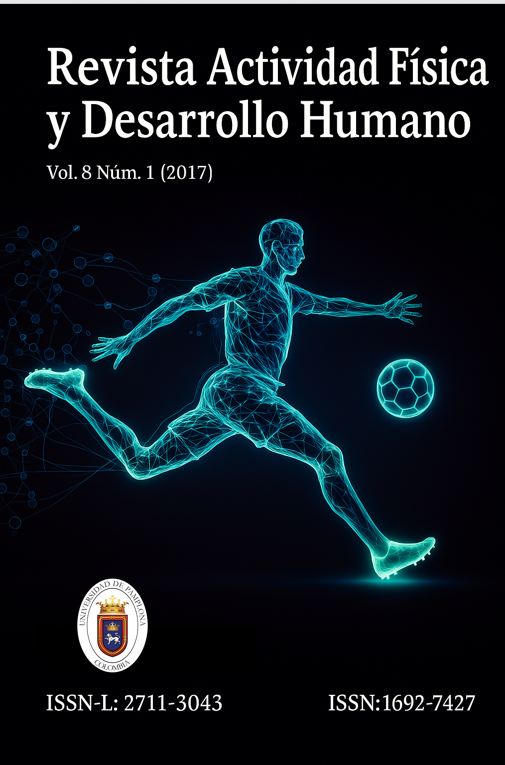Social Representations of Recreation, Sport, and Physical Education among Specialist Professors in the Bachelor’s Program in Basic Education with an Emphasis on Physical Education, Recreation, and Sport at the University of Pamplona
DOI:
https://doi.org/10.24054/afdh.v8i1.652Keywords:
Educación, Educación física, epistemología, sociedadAbstract
The purpose of this study was to analyze the configuration of social representations of teachers in the area regarding physical education, sport, and recreation, within the Bachelor’s Program in Basic Education with an emphasis on Physical Education, Recreation, and Sport at the University of Pamplona. The epistemological approach proposed for this research corresponds to pragmatism, the design was an exploratory sequential design, and the method used was grounded theory. The data and information collection procedure was carried out in two phases: Qualitative Phase and Quantitative Phase. In the qualitative phase, in-depth interviews were conducted; six interviews were carried out (two with each participating teacher, with an interval of eight (8) days between each interview). In the quantitative phase, a survey was administered, totaling forty-five surveys. All documents resulting from the information collected in the qualitative phase were exported and analyzed using Atlas.ti, while the quantitative phase was analyzed through correspondence analysis.
Downloads
References
Ander-Egg, E. (2000). Cómo organizar el trabajo de investigación. Métodos y técnicas de investigación III.
Azorín, F. Y., & Sánchez-Crespo, R. JL 1986. Métodos y Aplicaciones del Muestreo. Alianza Universidad. Madrid.
Balcells, M. C., Foguet, O. C., & Argilaga, M. T. A. (2013). Métodos mixtos en la investigación de las ciencias de la actividad física y el deporte/Mixed Methods in the Research of Sciences of Physical Activity and Sport. Apunts. Educació física i esports, (112), 31.
Creswell, J. W., Plano Clark, V. L., Gutmann, M. L., & Hanson, W. E. (2003). Advanced mixed methods research designs. Handbook of mixed methods in social and behavioral research, 209- 240.
Creswell, J. W., & Clark, V. L. P. (2007). Designing and conducting mixed methods research.
Creswell, J. W. (2009). Editorial: Mapping the field of mixed methods research.Journal of Mixed Methods Research, 3(2), 95-108.
Creswell, J. W., Klassen, A. C., Plano Clark, V. L., & Smith, K. C. (2011). Best practices for mixed methods research in the health
sciences. Bethesda, MD: National Institutes of Health, 10.
D’andrea, A. M., & Corral de Zurita, N. (2006). Representaciones sociales de formadores de formadores sobre el éxito y el fracaso académico y el buen y el mal estudiante. Actas de la XIII Reunión de Comunicaciones Científicas y Tecnológicas. Corrientes Argentina. Recuperado de: http://www. unne.edu. ar/Web/cyt/cyt2006/index. htm.
Elbaz, F. (1983). Teacher Thinking. A Study of Practical Knowledge. Croom Helm Curriculum Policy and Research Series. Nichols Publishing Company, 155 West 72nd Street, New York, NY 10023.
Glaser, B. G. A. L. (86). Strauss (1967): The Discovery of Grounded Theory: Strategies for Qualitative Research. London: Wiedenfeld and Nicholson, 81.
Greene, J. C., & Caracelli, V. J. (2003). Making paradigmatic sense of mixed methods practice. Handbook of mixed methods in social
and behavioral research, 91-110.
Hernández, J. G., Herrera, L., Martínez, R., Páez, J. G., & Páez, M. A. (2011). Teoría fundamentada. Seminario: Generación de Teoría. Facultad de Humanidades y Educación, Universidad del Zulia.
Hesse-Biber, S. N. (2010). Mixed methods research: Merging theory with practice. Guilford Press.
Johnson, B., & Turner, L. A. (2003). Data collection strategies in mixed methods research. Handbook of mixed methods in social and behavioral research, 297-319.
Krippendorff, K., & Krippendorff, K. (1990). Metodología de análisis de contenidoteoría y práctica (No. 001.42 K71).
Mora, M. (2002). La teoría de las representaciones sociales de Serge Moscovici. Athenea digital: revista de pensamiento e investigación social, (2), 078- 102.
Robert, S. (1994). Investigación con estudio de casos. cap, 1, 15-21.
Sandín Esteban, M. P., & Esteban, M. P. S. (2003). Investigación cualitativa en educación: fundamentos y tradiciones.
Selltiz, C. (1980). Métodos de investigación en las relaciones sociales. Ediciones Rialp.
Strauss, A. L., & Corbin, J. (2002). Bases de la investigación cualitativa: técnicas y procedimientos para desarrollar la teoría fundamentada. Medellín: Universidad de Antioquia.
Tashakkori, A., & Teddlie, C. (2010). Putting the human back in ‘‘human research methodology’’: The researcher in mixed methods research. Journal of Mixed Methods Research, 4(4), 271-277.
Teddlie, C., & Tashakkori, A. (2003). Major issues and controveries inthe use of mixed methods in the social and behvioral
sciences. Handbook of mixed methods in social & behavioral research,3-50.
Downloads
Published
Issue
Section
License
Copyright (c) 2018 ACTIVIDAD FÍSICA Y DESARROLLO HUMANO

This work is licensed under a Creative Commons Attribution-NonCommercial-NoDerivatives 4.0 International License.











